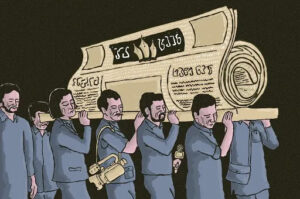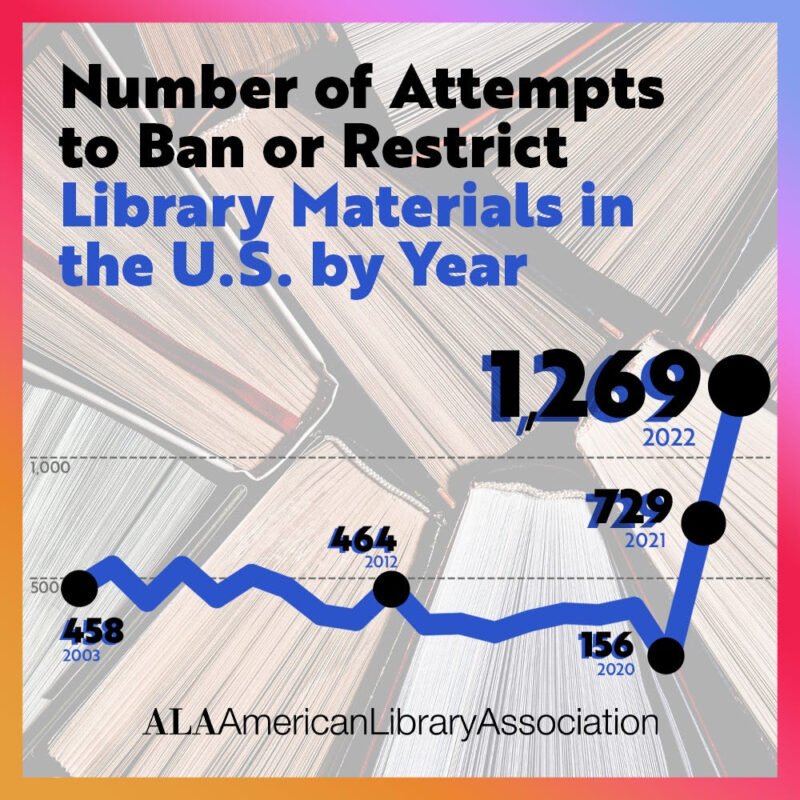
Disappearing media
This is the 199th edition of SHuSH, the official newsletter of the Sutherland House Inc.

SHuSH published its 200th newsletter a couple of weeks ago. Four years we’ve been banging this thing out. We now have 4,000 subscribers and a weekly readership of over 6,000 and I’ve learned a lot about book publishing along the way. Most of the time, it feels like it’s been a worthwhile endeavour.
One reason it feels that way, I suspect, is because I’ve made scant reference to politics. I complained about the Canada Council, but only because it forces publishers to submit to its overt political agenda as a condition of funding. I couldn’t resist teasing the folks at Penguin Random House for their revolt against the firm’s association with the “nazi” Jordan Peterson when their owners, the Bertelsmann Group, are descended from literal Nazis. I expressed sympathy for the strikers at HarperCollins and the plight of entry level publishing workers, as well as impatience with the all-books-should-be-free crowd. Otherwise, week in and week out, SHuSH strives to be apolitical. I’m in books for the writing, the learning, the stories, the powerful voices, the stimulating perspectives, the wide-open conversation, not to score points.
That’s a long way of explaining how we’ve gone 200 issues without addressing the book bans. And I’m only going to address them briefly today.
As you’ve heard, groups of parents in a bunch of American states are trying to keep certain books, most of them with racial or LGBT content, off the shelves of school libraries. Some are complaining about the existence of the same books in public libraries.
The vast majority of complaints, says the ALA, come from conservative activists, many of them affiliated with Moms for Liberty, a risible organization of latter-day Anita Bryants. The ALA accuses the Moms of censorship and interrupting the benign processes by which “professional librarians sit down with parents to thoughtfully determine what reading material is best suited for their child’s needs.”
Moms for Liberty is a menace but the notion that its members are the only ones with a political agenda is insupportable. They’re attempting to impose their politics on school libraries in opposition to concerted efforts within schools to promote the tenets of anti-racism, diversity, and inclusion in libraries.
Canadian and American library associations and their members use diversity toolkits to shaping the holdings of school libraries. The one used by the Toronto District School Board (TDSB) is typical. It takes the form of seventeen yes-or-no questions by which parents and librarians are asked to judge individual books. Does a title “provide opportunities for students to challenge the status quo” or “offer students an extension to act in response to injustice” or “reinforce, perpetuate or highlight stereotypes and/or misrepresent specific groups and identities,” and so on.
Ira Wells, a University of Toronto literature professor and the author of Norman Jewison: A Director’s Life (Sutherland House, 2021), was among the parents invited to participate in a TDSB equity review of a school library collection. As he wrote in the Toronto Star, the experience left him feeling complicit in the creation of a contemporary version of the Roman Catholic Church’s infamous Index of Prohibited Books:
The cumulative effect of the toolkit is to boil away the imaginative quality of children’s stories and treat them as vehicles for political content… A mindset that reduces literature to such black and white terms isn’t just uninterested in literature; it is anti-literate.
It takes two sides to make a culture war.
Maybe you think one side has stupid politics. Maybe you think the culling of books on the basis of ideological content is unwarranted censorship, regardless of whether the process is led by professionals or Moms for Liberty. Maybe you have a strong stomach and can accept these fights as the normal and necessary process by which concerned parties negotiate educational priorities, curricula, and what students should or shouldn’t be exposed to in the classroom. There are a lot of ways to look at it.
I find the whole thing faintly ridiculous. We’re not talking United States v One Book Called ‘Ulysses’ or Grove Press v. Gerstein or another of those famous cases that would have made possession of a particular book by an ordinary citizen a criminal offence. The word “ban” is being abused here. The American Library Association regularly issues alarming press releases about the record number of “book bans,” by which (if you read the fine print) it usually means book “challenges,” which (if you keep reading) are nothing more than complaints about the presence of books in libraries. It doesn’t trouble me that people complain about the available selection of books in libraries but the ALA finds it “exhausting, frightening, outrage inducing.”
Pen America says a book ban occurs when a book is selected by librarians or educators and their choice is “overridden by school boards, administrators, teachers, or even politicians, on the basis of a particular book’s content.” Never mind that those parties exist to supervise what’s happening in schools and influence decisions over what is presented to students.
The fact is that it’s impossible to ban a book in North America today. I found all of the titles I’ve seen mentioned as subject to bans right there on Amazon. I found free copies of a lot of them on the Internet and cheap used copies on Bookfinder.com. So we’re not talking about banning books so much as deciding which titles should be available in some of the least trafficked rooms in our schools. That deserves a discussion, not a war.
There is no evidence kids are engaged by what adults have to say on these subjects. My guess is that if you were to ask them to list their sources of information about the world around them, school libraries would barely register. Given everything they’re exposed to on the internet, worrying about the school library feels beside the point.
It is beside the point. The chart below is from the National Assessment of Educational Progress’s annual survey of the reading habits of young people, the most reliable longitudinal study of its kind.
Now how do we feel about the future of books, publishing, libraries, humanity? I’m sure the results have more to do with personal technology than with the parents and librarians imposing their very adult politics on kids’ reading option, but I doubt the impositions are helping. If nothing else they’re a distraction from more pressing issues. The politics of the books in school libraries scarcely matter if kids don’t read.
So let’s back the politics out of the stacks, give kids access to a wide range of books and let them pick what they want, even if their choices are foul. It is well established in medical science that letting children play in the dirt and get germy makes for healthier, stronger, more resilient adults.
Our regular reminder to readers to support independent booksellers. Click this link to make the above map come alive.

This is the 199th edition of SHuSH, the official newsletter of the Sutherland House Inc.

There was an interesting piece in the New York Times a week or so ago about James Daunt (above), the incoming chief executive of Barnes & Noble, the most important bookstore chain in the English-speaking world. It didn’t quite get to the nub of the matter. Barnes & Noble has

The world of non-fiction from Sutherland House ( and Beyond )